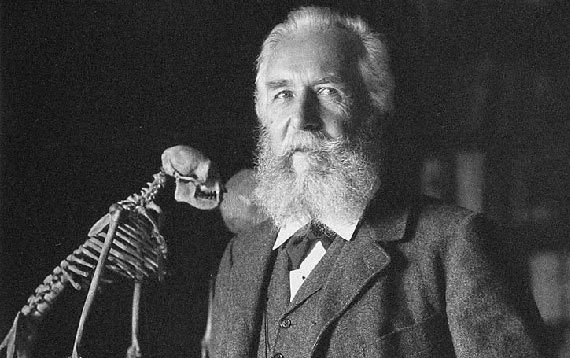The words of young activist Greta Thunberg, delivered in a speech at the 2019 Climate Action Summit in New York, serve as a powerful image of the change that has taken place in recent years. Action to combat climate change has received heavy television coverage and is a cause for concern for millions of citizens — particularly among younger generations. At the same time, environmental activism has reached levels of popularity and numbers of followers that were unheard of just five years ago.

The recent surge in concern for the environment aside, the history of the study of the relationship between living beings and their environment and the defense of their value in the political arena dates back decades, even centuries if we consider their founding fathers. Learning more about their origins can be useful in analyzing the current movements.
The terms “ecology” and “environmentalism” are a good starting point. Although these are two interrelated concepts that often go hand in hand, it is key that we understand the difference between the scientific discipline of ecology and the social and political movement known as environmentalism.
Ecology, or ecological science
Ecology stands for “the relationships between the air, land, water, animals, plants, etc., usually of a particular area, or the scientific study of this” as defined by the Cambridge Dictionary. It is a branch of biology and its origins can be found in ancient Greece. Hippocrates wrote that, in order to investigate medicine, it was necessary to consider the seasons and the characteristics of the climate, laying out how vital the environment is to the health of the living beings that inhabit it. Aristotle, meanwhile, observed and recorded the characteristics of the flora and fauna around him and speculated about the relationship between them.

However, modern ecology did not first emerge until the 19th century. It was during the 19th century that the word “ecology” was coined by the German naturalist and philosopher Ernst Haeckel (1834–1919). Haeckel formed the word from the Greek “oîkos” (house) and “logógos” (knowledge, reason) — and with good reason, since this is, in a broad sense, the study of our home. Known for disseminating Darwin’s work, in his General Morphology of Organisms, Haeckel describes ecology as the science that studies the relationships of organisms with the world around them. In 1895, the Danish Johannes Eugenius Bülow Warming wrote “Oecology of Plants,” a seminal text for this science, in which he describes the world’s main biomes, i.e. the regions into which the planet can be divided based on shared climatic and geological factors and, thus, shared flora and fauna.
Nowadays, ecologists play an extremely important role in the study of biodiversity loss, one of the main environmental concerns of the present day. Ecology investigates the extent to which species loss endangers ecosystems and makes them less resistant to major environmental changes, which may, in turn, have disastrous consequences for the economy of the affected regions.
The environmental movement
In contrast to the science of ecology, environmentalism is a socio-political movement concerned with the protection of the environment. While some argue that it dates back further, the environmental movement is usually said to have begun in the 1960s and 1970s.
The year 1962 was a key year because it saw the publication of “Silent Spring,” a book written by US marine biologist Rachel Carson that warned about the problems caused by the large-scale use of synthetic pesticides. The publication was a catalyst in the emergence of environmental awareness in the US. The celebration of the first Earth Day on April 22, 1970 was one of the first fruits of the spread of this environmental awareness. As a result, over 12,000 events were held throughout the United States, helping to inform 20 million citizens about the importance of environmental protection.
But another key element in the environmental movement garnering the same momentum as other great movements of the day, such as the pacifist movement, is influence of the beginnings of environmental organization Greenpeace. In 1971, on a boat that they christened “Greenpeace,” a group of activists set sail to protest against the nuclear tests that were to be carried out on Amchitka Island, Alaska. Although they were intercepted by the authorities before they were able to reach their destination, their actions made such an impact that they were able to secure the funds and volunteers to carry out more expeditions in the following years and, in 1972, they decided to set up an organization known as the “Greenpeace Foundation.” Throughout its nearly 50 years of existence, the foundation has brought us countless hard-hitting images of protests to raise awareness about environmental issues and is the world’s most widely recognized environmental association.
Project Ahab, against commercial whaling, was one Greenpeace’s most impactful campaigns in the 1970s.
However, the last few years have seen the rise of new social movements that have given new impetus to environmental activism that aims to combat some of the most pressing issues of our time, such as global warming. One example is the UK-born Extinction Rebellion, a movement to fight mass extinction and the climate crisis, whose campaigning played a key role in making the UK and Ireland the first countries to declare a climate emergency in May 2019.
Science and activism: A necessary relationship
Ecology does not understand ideology; like any good science, it understands data. However, this data have been instrumental in nurturing the growing environmental movements in recent years. And science leaves no room for doubt on certain issues, such as the climate crisis, which is supported by most scientific studies on the subject.
Environmental activism, meanwhile, has been essential in achieving some of the changes in international environmental legislation in recent years, as civil society is able to assert pressure on its institutions. Therefore, while it is important to draw a clear distinction between the two, there is no doubt that activism and science often cross paths and that, when this happens, it is generally beneficial for the planet.
Comments on this publication